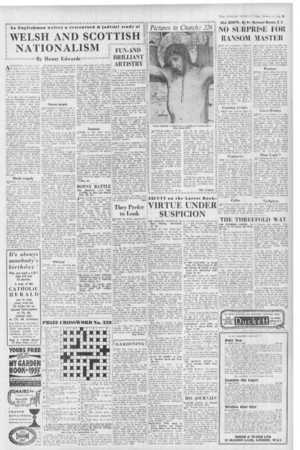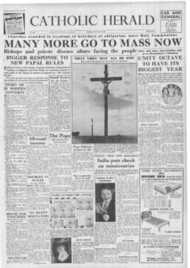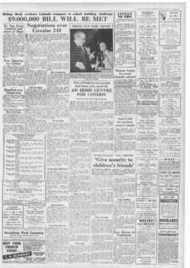Page 3, 14th January 1955
Page 3

Report an error
Noticed an error on this page?If you've noticed an error in this article please click here to report it.
Tags
Share
Related articles
A Call From The Heart Of Wales
The Welsh: A
Dilemma Over Devolution
To Fr Crane
Wales And The Church
WELSH AND SCOTTISH NATIONALISM
By Henry Edwards
ALTHOUGH I have been bound within the last few years to take notice of writings upon the nationalist movements of these isles, I am tolerably sure that the late Sir Reginald Coupland's study is the lirst by an Englishman of the by now important nationalist movements of Wales and Scotland. For that reason alone I commend it It is, alas, only too common to find the Englishman of good will affecting to laugh off both these movements, though there have been and are some important exceptions, such as G. K. Chesterton, who warned England of the peril that lay in treating Wales in the future as England had treated Ireland in the past. Mr. Christopher Hollis. M.P. for Devizes, may be said to have some indirect sympathy with Scottish and Welsh nationalism-his efforts at parliamentary reform infer such support.
The major defect of this study is one which cannot be avoided. Sir Reginald died in 1952. and the bulk of the study does not deal with events later than P)45. But the fact is that both movements began to gather considerable speed after Sir Reginald's death. The Welsh Petition and the Scottish Covenant movements for a mild measure of self-government. through Parliaments with some domestic powers have the support of members of parties widely differing from each other. I myself ant, I believe, one of the very few Welsh Tories supporting the Petition movement, a circumstance which leads nte to comment upon one of the most interesting differences in the two movements of Wales and Scotland.
Welsh tragedy WALES csemble> Ireland up to WALES csemble> Ireland up to a point in that in the past the Welsh peasantry found themselves beset by rack-renting landlords, who gave their chief loyalty to England. There were exceptions. notably among certain border Welsh gentry who. curiously enough, were often Catholics. Ireland had her own patriotic Irish gentryrather more. I should suppose, than Wales. But Scotland at a critical stage in her history found that national feeling was widespread among a considerable number of Scottish gentry. Indeed, the opposition to the Act of Union in Scotland was, as Sir Reginald admits, the opposition of Tory lairds, including of course the Jacobites, And even in this century you had John Buchan, a stout Tory, telling Scots that they all ought to be Nationalists. I cannot find any equivalent in Wales unless it be that great Welsh patriot and Tory squire Robert Wynne of Garthewin. And perhaps I ought to mention that sturdy Welsh Tory and Nationalist, and Anglican parson. the Rev. A. W. Wade-Evans
But Wales has no-one to compare with the late Duke of Montrose or that scholarly $cottish Tory and ardent Nationalist Dr. Agnes Muir Mackenzie.
It is one of the tragedies of Wales that her gentry committed treasona treason of the spirit. And one tragic result is that Welshmen have been presented with a false alternative, Toryism or radicalism (which here may include socialism). The Welsh Nationalist does his best to point out to his fellow-countrymen that this alternative is a means whereby an alien power divides and rules.
'Secret people' 'Secret people' SIR Reginald Coupland's study is marked by considerable restraint. He may have realised that nationalism provokes strong feeling, and he tries to overcome such reaction by being as judicial as he can. Indeed, his treatment is such that he deliberately emphasises the ease for a thorough-going nationalism, a case which he regards as erroneous. Lest anyone were to say he did not give value to his opponents. he gives them the chance of having the last word. And that is a generosity so rare that it is disarming. Dare one be critical because of such generosity? I believe he would have welcomed such criticism. But before 1 criticise, I ought to pay full tribute to Sir Reginald's admission that Welsh Nationalism owed a very great debt to Ireland. Scotland also owed a debt. An English friend of mine recently suggested that the secret people of England might rise the last and he in the debt of their fellow-nations, (And was not Chesterton an English Nationalist?). Sir Reginald has grappled with the central problem of this study which is the problem of the one and the many. There is a sound enough sense in which we may speak of the British -Isles. They do possess some integrity. But they possess it in spite of the fact that they are composed of several entities. each of which has such a significant form that the remarkable surprise is that nationalist movements should have been necessary at all. Not that the nations have ever been unitary in the extreme. Apart from the Irish struggle. there have been traditional exceptions, such as the Tynwald Parliament of the Isle of Man. which, by the way, certain typical Fabian socialists in England dislike, and the Parliaments of the Channel Islands together with a semi-feudal oddity in Sark.
Then, apart from such Scottish autonomy as remained .after 1707 (in the maintainance of Scots law for example). there were curious legal puzzles touching the status of the Duchy of Lancaster and the Principality of Wales.
Burke reminded his own day that there was a mystery about the C barter granted to the first Prince of Wales, Not until the abolition of the Great Sessions in 1830 was the incorporation of Wales and England completed and it was then, notice, that the first signs of nationalism in Wales were to be discerned.
Political Political THOSE signs are commonly des cribed as cultural. And it is here that I am forced to he critical. Like so many other reasonable gentlemen. both English and Welsh, and possibly Scottish. Sir Reginald really believed that political nationalism was as unfortunate and even bad as cultural nationalism was good. In order to state my case as forcibly as I can. I am inclined to say that the matter stands the other way about.
I make no bones about my political nationalism: it is when I am asked to subscribe to cultural nationalism that I feel I would like to leave my friends among the Druids. Wales, like Scotland and Ireland and England, is a nation: I am not going to argue whether any of them are nice nations or whether my nation contains more culture or a
better culture than any of the other nations. In spite of the fact that I think the Welsh language ought to he defended and that I believe it could under certain conditions go hack on the offensive, I am not specially interested in the matter. It ought to suffice if Welshmen, like Irishmen, discover that their job is to construct the institutions that will maintain their own society.
Mr. E. Watkin, well-known Catholic don (whose name suggests a Welsh origin) has criticised nationalism chiefly of the nasty Nazi sort-but admits that. the Welsh feel themselves to be a nation, as do the Scots, and that without a State organ a nation is too weak to maintain itself. This is especially true when a nation without a State has to cope with the full force of a nationState into which it is incorporated. Even if the governors of that nationState are sympathetic. the nation that lacks its own political instrument has no guarantee of permanence.
Tensions Tensions
THERE is ones other matter which though extrinsic to the book itself has much to do with it. I mean the date of its publication. Two years have passed since the death of the author, and it is at this present that it comes before us. I believe that is important, and I propose to emphasise the importance. It is a sign that England is now aware of the tensions among Welsh and Scottish people, many of whom arc not by any means consciously nationalist. And, though I admit to being a little in the know, I suggest that we keep our eyes open for a work by an eminent English historian which will make Welsh Nationalists a goodly present by giving surprising support for their cause.
*Collins, 25s.
blog comments powered by Disqus









